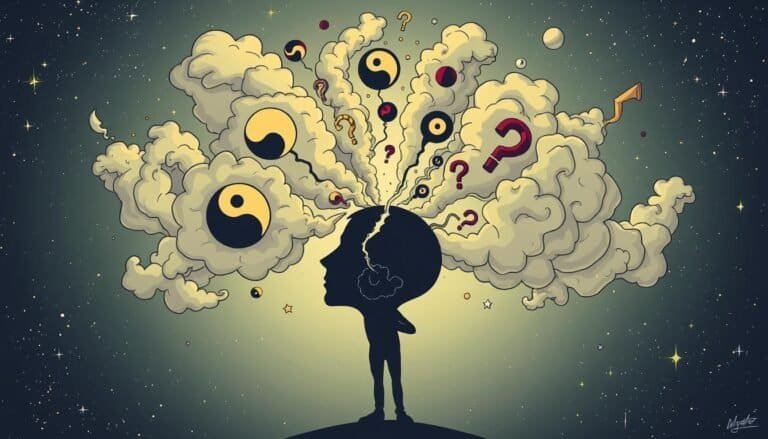The Role of Reason in Enlightenment Philosophy
Imagine if your beliefs came from reason, not just tradition. This idea is key to Enlightenment philosophy, a big change in Europe in the 1600s and 1700s. It made reason the main base for what’s right and true.
Thinkers of this time used evidence and questions to challenge old beliefs. They started the ideas that shape our modern world in science, ethics, and philosophy. This piece looks at how reason changed our view of what humans can do. It also made us rethink faith, freedom, and how we move forward together.
Key Takeaways
- The Enlightenment emphasized reason as a means to challenge and improve human understanding.
- This era fostered advancements in science, political theory, and ethics through rational thought.
- Key figures like Benjamin Franklin and Thomas Jefferson championed religious freedom and individual rights.
- The period’s legacy continues to influence modern debates on religion and morality.
- Understanding Enlightenment principles is crucial to grasp the evolution of contemporary thought.
Introduction to the Enlightenment Era
The Enlightenment era lasted from the late 17th to the late 18th century. It was a time of big changes in European thought. This era blended ideas about God, reason, nature, and humanity into a new worldview.
At the heart of the Enlightenment were values like reason, knowledge, freedom, and happiness. These ideas became very popular in the West.
Many Enlightenment movements sprang up across Europe. Each added to a rich mix of philosophical ideas. In France, thinkers like Voltaire and D’Alembert were key figures. Scotland had its own stars, including Adam Smith and David Hume.
Germany’s Enlightenment, or die Aufklärung, was also important. It featured thinkers like Immanuel Kant and Moses Mendelssohn.
Philosophers during this era questioned old traditions and challenged those in power. Kant saw enlightenment as freeing people from their own immaturity. He believed in the power of independent thought.
This era was full of debates, especially with religion. The focus on reason versus traditional authority caused disagreements. Isaac Newton and René Descartes set the stage with their ideas. Newton’s Principia Mathematica showed the universe as a predictable place, ruled by laws.
The Enlightenment was a time of great intellectual growth. It brought new ideas to art, philosophy, and politics. This era valued reason and sought to understand human life and the world better.
Understanding Enlightenment Philosophy
Enlightenment philosophy changed the game from 1685 to 1815, shaping modern thought. It put a big focus on Reason in Enlightenment thought. Thinkers like John Locke, Isaac Newton, and René Descartes showed us how to use reason and evidence to better our lives.
This movement touched politics, science, and social issues. Philosophers used reason to fight for rights and freedom. They wanted to shake off old ways, like absolute monarchy, showing that people should have a say in their governments.
They also talked about the importance of a balanced government. Montesquieu suggested that power should be spread out to prevent abuse. This idea helped create democratic systems. Locke and others pushed for individual rights, making a case for freedom and equality.
Enlightenment thinkers pushed for equality and against nobility’s special privileges. Their ideas sparked big changes, like the American and French Revolutions. These events showed the power of fighting for freedom, equality, and individual rights.
Even with its big impact, Enlightenment philosophy still faces challenges. Issues like inequality and racism keep us from fully living its ideals. Today, we see conflicts between old Enlightenment values and new political issues. This shows we need to keep exploring and applying these important ideas.
| Aspect | Impact |
|---|---|
| Government | Advocated for separation of powers and checks and balances. |
| Individual Rights | Introduced the notion of natural rights that protect individual freedoms. |
| Science | Promoted empirical evidence and the scientific method as means of understanding the world. |
| Social Equality | Challenged hereditary privileges, advocating for rights regardless of birth status. |
| Revolutionary Ideas | Inspired movements for political change based on Enlightenment principles. |
The Role of Reason in Enlightenment Philosophy
The Age of Enlightenment was a big change in thought. Reason was at the heart of this change. Philosophers saw reason as a way to challenge old beliefs and show how society works.
They believed reason could change how we see things and guide us in making right choices.
Defining Reason as a Core Principle
Enlightenment reason meant thinking deeply, understanding information, and making logical decisions. It moved away from old beliefs based on superstition. Thinkers like Voltaire and Rousseau said reason could lead to a better understanding and a better society.
This focus on reason led to big changes in education, science, and how we govern ourselves.
Reason’s Impact on Human Thought
Reason had a huge effect during this time, changing how we see knowledge and power. It made people question authority and think more critically. This led to new ideas in science and philosophy.
It also helped start new movements like liberalism and capitalism. These ideas were built on the idea of individual rights and making decisions based on reason.
| Idea | Impact on Society |
|---|---|
| Emphasis on Reason | Challenged traditional authority |
| Promotion of Liberalism | Encouraged individual freedom and rights |
| Advancement of Science | Shifted focus towards empirical research |
| Separation of Church and State | Reduced religious influence in governance |
The Role of Reason in Enlightenment Philosophy shows how thought, society, and governance work together. It shaped our modern ideas of democracy and personal freedom.
Key Enlightenment Thinkers and Their Rationale
Enlightenment thinkers and reason changed philosophy, politics, and ethics a lot. René Descartes and Immanuel Kant were key in this change. They used reason to explore knowledge and morality.
René Descartes and Rationalism
René Descartes is seen as the start of modern philosophy. He believed in systematic doubt to find truth. He said, “Cogito, ergo sum” (“I think, therefore I am”), showing the importance of self-awareness in finding knowledge.
Immanuel Kant and the Quest for Knowledge
Immanuel Kant took the discussion further on knowledge and ethics. He said we need both experience and reason to understand the world. Kant also talked about moral principles we should follow. He linked ethics with the search for knowledge.
Scientific Revolution and Reason
The Scientific Revolution changed how we understand the world, moving from old beliefs to new facts. This change happened in the 16th and 17th centuries. It brought new ways of thinking that changed science and led to the Enlightenment. The Importance of reason in Enlightenment comes from the big ideas of this time. These ideas made people value thinking over old beliefs.
The Transition from Theology to Science
In the 17th century, the scientific method started to take shape. It focused on experiments and careful watching. This led to new discoveries in many areas, like math, physics, and biology. The British Royal Society was key in this change. It was a place where scientists shared their work, making science more accepted and encouraging more questions.
Newton’s Influence on Enlightened Thought
Isaac Newton’s work was a big step forward in the Scientific Revolution. His book, Principia Mathematica, brought together ideas from others and introduced universal gravity. This idea changed how we see the stars and our place in the universe. It also made thinkers in the Enlightenment use science in their ideas.
| Key Figures | Contributions | Impact on Enlightenment |
|---|---|---|
| Nicolaus Copernicus | Published heliocentric theory (1543) | Challenged traditional views, encouraged quest for knowledge |
| Galileo Galilei | Advocated experimentation and made astronomical observations | Supported heliocentric model, emphasized empirical evidence |
| Isaac Newton | Developed laws of motion and universal gravitation | Unified scientific thought, influenced rational philosophy |
| Francis Bacon | Promoted empirical methodologies and scientific method | Established framework for modern scientific inquiry |
| Johannes Kepler | Contributed laws of planetary motion | Validated heliocentrism through mathematical precision |
Reason and Political Theory in the Enlightenment
The Enlightenment was a key time for political thought. It focused a lot on reason’s role. Thinkers pushed for liberty, equality, and fraternity, changing how we see government and social contracts.
Enlightenment Ideas on Liberty and Equality
During this time, reason was seen as very important. It challenged old ideas about who had power. John Locke and Jean-Jacques Rousseau talked about the social contract. They said governments get their power from the people.
This idea helped start democratic movements. It said that individual rights are key and should come first.
The Influence of Enlightenment Thought on Modern Democracy
Many thinkers from the Enlightenment shaped today’s democracies. Montesquieu talked about the need for a system where no one person has too much power. This idea helped create checks and balances in government.
Enlightenment ideas also pushed for rulers to be accountable. This helped create governments that protect civil rights and fight for social justice.
Ethics and Moral Philosophy during the Enlightenment
The Enlightenment changed the way we think about ethics and moral philosophy. It was a time when reason became key in making moral choices. Thinkers questioned old, religious ways of thinking about right and wrong.
They believed in using reason to guide ethical actions. This led to new ways of looking at moral issues. It also started debates about human dignity and rights we see today.
Shifts in Moral Understanding
During the Enlightenment, moral ideas changed a lot. Immanuel Kant talked about duty and universal moral laws. He said reason was crucial in ethics. His idea, “Sapere Aude” or “dare to think for yourself,” stressed the power of individual thought.
Jeremy Bentham, on the other hand, talked about making decisions based on happiness. He suggested using a hedonic calculus to weigh pleasure against pain. These ideas moved away from old, divine rules to new ones based on human experience and reason.
The Role of Reason in Ethical Decision-Making
Reason played a big part in making ethical choices during the Enlightenment. Kant’s ideas on rational moral laws helped clarify rights and duties. Mary Wollstonecraft fought for women’s rights, using reason to support her arguments.
Adam Smith talked about building good character through prudence and kindness. David Hume linked ethics to feelings, showing how emotions and reason are connected. This view helped shape today’s ethical ideas.
Critiques of Reason in Enlightenment Thought
The Enlightenment was a time of big ideas in the 1700s. It’s known for valuing reason. But, there were doubts about its limits. Edmund Burke said ‘prejudice’ and ‘naked reason’ both matter. He believed our experiences and traditions help us understand the world.
People worried about the Enlightenment’s focus on individual reason. They feared it could lead to a lack of morals and isolation. John Rawls’ idea of the ‘original position’ was questioned. It seemed to turn people into just numbers, losing their unique identities.
Neo-Marxists and postmodernists saw the Enlightenment as incomplete. They said it aimed for freedom but didn’t quite get there. Adorno and Horkheimer pointed out that reason can be controlled by our emotions, making it less effective for making moral choices.
They also talked about the role of emotions in Enlightenment thought. Denis Diderot believed reason was useful but so were passions. He thought feelings were key in making moral and artistic choices, along with David Hume.
This view doesn’t mean rejecting reason altogether. It’s about finding a balance. Critics want to combine rational thinking with our feelings and experiences. This approach aims for a deeper understanding of who we are.
Rationalism vs. Empiricism in Enlightenment Philosophy
The Enlightenment was a time of deep thought, with rationalism and empiricism at the center. These ideas greatly influenced Western thought. Rationalists believed in the power of reason and innate ideas. Empiricists thought sensory experience was key to understanding the world.
Key Differences Between Rationalism and Empiricism
Rationalism was led by thinkers like René Descartes. He believed reason could uncover knowledge without the need for sensory experience. This idea was popular in the 17th century, known as the ‘Age of Reason.’
Philosophers like Leibniz and Spinoza also believed in innate concepts as the foundation of knowledge. They thought these ideas helped us understand the world.
Empiricism, on the other hand, was championed by John Locke and David Hume. They believed knowledge comes from experience. Locke stressed the role of experience and reason in understanding moral truths.
This debate influenced many thinkers and shaped philosophy. Some, like Descartes, showed traits of both rationalism and empiricism. This led to diverse interpretations and adaptations within each movement.
The debate between rationalism and empiricism enriched philosophical discussions. It continues to influence thought today. Understanding these ideas helps us see how knowledge and theories have evolved. It shows the complexity in seeking truth.
Legacy and Impact of Enlightenment Reasoning
The Enlightenment’s ideas have left a lasting mark on Western society. They have changed philosophy and science. These ideas challenge old beliefs and encourage us to think deeply about ourselves.
Long-Term Effects on Western Philosophy
Enlightenment thinking set the stage for modern philosophy. It taught us that reason is key to understanding the world. Thinkers like Immanuel Kant showed us how to break free from our own limits.
They encouraged us to think for ourselves. This led to new ways of thinking about government, morality, and our rights. The ideas of liberty, equality, and the social contract are still with us today.
Influence on Modern Science and Social Thought
Enlightenment ideas have greatly influenced modern science. Isaac Newton’s work changed how we see the world. His laws of gravity and motion showed us the power of nature.
This shift from spiritual to scientific thinking has driven innovation. In America, these ideas led to big changes in religion and government. They encouraged a move towards Unitarianism among New England ministers.
Today, the Enlightenment’s ideals still inspire us. They remind us that science can help us improve society and make progress as humans.
Conclusion
The Enlightenment era, from 1688 to 1789, was a key time in history. It made reason a central idea in fields like science, ethics, and politics. René Descartes, with his famous saying “I think, therefore I am,” started rationalism. He showed how reason helps us understand ourselves and what’s right and wrong.
More people could read, and places like coffee houses became spots for deep talks. This led to a lively public sphere where new ideas could spread. These ideas changed how Europeans thought about freedom, fairness, and seeking knowledge. They also explored the complex link between faith and reason, a topic still debated today.
The Enlightenment’s impact is still felt in today’s discussions on government, science, and ethics. Looking back, we see that the ideas from this era are still vital. They push us to question and seek knowledge, aiming for a more enlightened world.
Source Links
- Why the Enlightenment still matters today
- Benjamin Franklin and the American Enlightenment | Bill of Rights Institute
- Enlightenment
- Enlightenment | Definition, Summary, Ideas, Meaning, History, Philosophers, & Facts
- Enlightenment Period: Thinkers & Ideas | HISTORY
- What Is the Enlightenment and How Did It Transform Politics?
- Age of Enlightenment
- The Enlightenment | History of Western Civilization II
- Enlightenment Thinkers | Western Civilization II (HIS 104) – Biel
- The Age of Enlightenment | History of Western Civilization II
- The Scientific Revolution | History of Western Civilization II
- 551004-ch04.2.indd
- Scientific Revolution | Definition, History, Scientists, Inventions, & Facts
- The Enlightenment | Causes & Effects
- 12.1 Enlightenment Social Theory – Introduction to Philosophy | OpenStax
- Enlightenment Ethics | Kinnu
- Microsoft Word – Kant and The Enlightenment_Antonio_Pele.docx
- What’s Wrong With The Enlightenment? | Issue 79
- Why the Enlightenment was not the age of reason | Aeon Ideas
- Rationalism vs. Empiricism
- Rationalism vs. Empiricism
- The Impact of Enlightenment in Europe [ushistory.org]
- Chapter 11: The Enlightenment
- Faith and Reason | Internet Encyclopedia of Philosophy
- Introduction to Enlightenment | M.A.R. Habib







